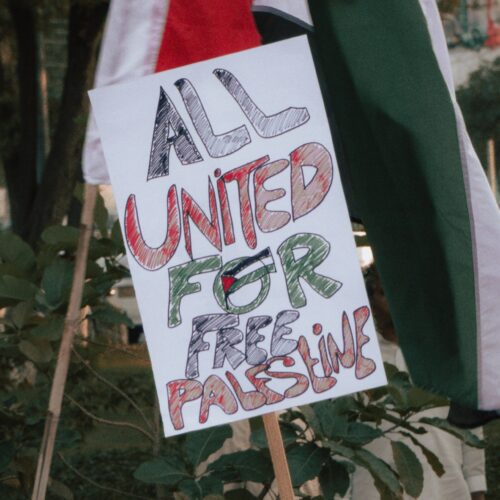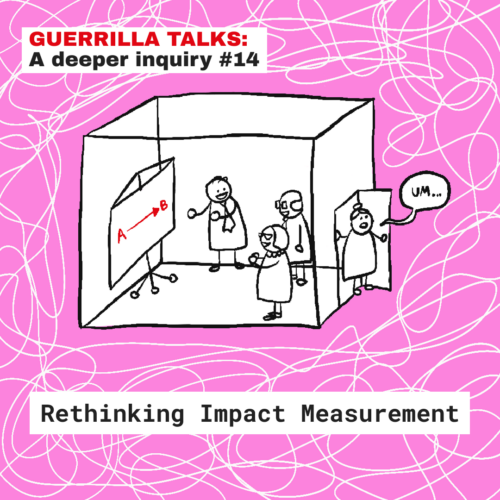
We could not be more proud of the company we keep. The eclectic group of Guerrilla Grantees from the Spring Closed Call of 2017 are all on display below. In order to give you a better grasp on what exactly it is we’re funding for these organisations, we have outlined some ‘project’ basics for each one. We encourage you to visit their websites and follow their social media pages to get the full activism-awesomeness experience, and we will be posting ‘feature’ posts for each of our grantees in the coming weeks, but for those looking for a quick overview, the synopses follow:
European Action Coalition for the Right to Housing and to the City
A network of 27 grassroots groups fighting for housing justice in 20 countries across Europe; they support members in their respective struggles in their home countries, and bring them together to campaign effectively in coalition.
Project: They are going to run a 3 year European campaign around the financialisation of housing and the city – and the Guerrilla grant will contribute to funding of this first year. The campaign will integrate cohesive messaging and imagery, while also allowing movements in each country to focus on the most pressing elements of private finance’s entry into their housing market. Defaulting home-owners across the Mediterranean and Eastern Europe will organise around eviction and mortgages, while renters across Europe will connect the dots between high rents and international speculation.
The campaign involves a process of alliance-building transnationally with other movements organising against financialisation of their sector, as we will share many of the same targets. Within a couple of years this may result in a conference, and a far more integrated movement against all forms of financialisation.
This campaign will have three phases: 1) a research phase to proving insights on how to learn collectively about how financialisation works in all the different, national contexts, 2) an alliance-building phase of reaching out to other struggles against financialisation and building of a common narrative and 3) the mass action phase, where policy demands will have been agreed upon and precisely which stakeholders who can grant them will be identified. Decentralised actions will take place throughout the process, both to mobilise in solidarity, and to test narratives with the public.
The prevailing message: Homes for people, not for profit! You’re not aloan!
A wide-ranging and fast-growing grassroots campaign that organises actions of mass civil disobedience against the use of coal power; engaging thousands of people in the fight for climate justice.
Project: At some point in time, that shall here remain undisclosed, the Ende Gelände action of civil disobedience will take place in the Rhineland. Thousands of activists from all over Europe (6,000 people expected) are going to block mining infrastructure to stand up for a just energy transition. The action will convey an image of diversity, creativity and openness. The action is part of a bigger event called “Aktionstage”. Within one week different groups from local initiatives, various climate camps, environmental protection organizations and climate activists from all over Europe ring in the coal phase out in Germany. The way into the coal pit, on top of the digger or onto the railways causes many expenses. The most difficult costs to cover are those with direct relation to the action and it is towards those that the Guerrilla grant will go.
A transnational, non-profit and non-state organisation working to promote democracy, equality and culture beyond the nation state as well as imagine, demand and enact alternatives for a viable future for Europe.
Project: The aim is to support the development networking and capacities of young activists working from within and outside the newcomer communities to fight for human rights, connect them with the large EA network to fight against the normalisation of hate speech and racism, and increase the visibility of newcomer activists, as well as those fighting with them, on the broader transnational scene. They want to boost the capacity of local and transnational actors to provide alternatives to the retreat to nationalism or dysfunctional European institutions and to protect and increase the resilience of minority communities.
To do this they will, through partnerships with like-minded organisations, run a training programme on nationalism, hate speech and practices to counter these trends. The aim is to strengthen the capacity of promising young civic leaders and emancipatory movements emerging from the anti-discrimination and refugee rights fields to challenge nationalism and nationalist rhetoric. They will conduct 2 trainings until the end of 2017 that will reach 45 activists (mainly from marginalised groups), they will receive mentoring and, next to implementing their own projects with the added input, also give feedback & provide an added value perspective for other European Alternatives activities.
A project of eLabEurope, a non-profit organisation registered in Spain and whose mission is foster citizen engagement in the European space. The Good Lobby democratizes lobbying by connecting public expertise with NGOs to make people’s voices heard in the policy process and society at large.
Project: Within 2017, the Good Lobby has the following objectives:
a) Build a team of international law firms with Brussels offices whose lawyers could commit to working on selected pro bono projects for Brussels based NGOs as well as academics (they have gathered six up until now).
b) Identify up to 10 EU policy NGOs from among their network of 100 with whom to carry out carefully managed trial projects (10 per year).
c) Launch the annual THE GOOD LOBBY PRO BONO AWARD for Brussels-based lawyers, law firms and other pro bono professionals. The award should be co-sponsored by a leading EU affairs media outlet and should celebrate pro bono work carried out by Brussels-based lawyers in the context of EU law and policy.
d) Run six Pro Bono Masterclasses in Europe and across EU capitals: so as to reach out to more than 100 participants.
e) Run EU Advocacy School so as to reach out to more 35 local activists across Europe.
f) Pursue their survey and international development so as to cover six EU member states.
A co-creation project between Esalen Institute, Ashoka, Fetzer, Skoll, Synergos and Impact Hub focused on bringing together inner wellbeing and social change through a limited life initiative (3 years), that is a undertaking 4 key pillars of activity which are the key points of leverage to fundamentally shift the culture of the social change space.
Project: As the 3-year project is nearing its end, the team needs to develop the storytelling component so as to disseminate all the knowledge that has been gathered and increase the impact of findings by reaching relevant audiences with their content. Along with communicable teachings and good practices communication, this exercise will assist in greater outreach and thus refinement of the evolutionary steps of The Wellbeing Project. The Guerrilla grant will support this endeavour while providing nonfinancial support with regards to dissemination, narrative building, and communication.
Berlin Bicycle Referendum (Netzwerk Lebenswerte Stadt)
A German nonprofit organisation that exists to create more equitable, social, sustainable, and people-friendly cities and urban spaces. They aim to bring about a major transition in the way mobility is practiced, away from the dominance of automobiles and towards sustainable and livable cities.
Project: Together with the ‘Mehr Demokratie e.V.’ Hamburg Group, the team will bring together varied initiatives surrounding the idea of direct democracy and sustainable people-friendly urban spaces. These initiatives will strengthen one another’s capacity to act in unison to influence their environments and cities.
A user-friendly, strictly non-partisan, internet platform will be developed to contain suggestions and recommendations for public awareness and public relations campaigning, the carrying out of petitions, civic participation and referendums and associated forms of direct democracy. The platform serves for transparent and accessible civic structures. All knowledge and contents on the platform will be publicly available. The creation and maintenance of the platform in the first phase will be the purview of the Berlin and Hamburg initiatives, but should be decentralized and further development should be carried out from the entire country.
The Transnational Institute (TNI)
An international research and advocacy institute committed to building a just, democratic and sustainable world by strengthening international social movements with rigorous research, reliable information, sound analysis and constructive proposals that advance progressive, democratic policy change and common solutions to global problems.
Project: The Guerrilla Grant will go toward to European dimension of their ‘shrinking space’ for dissent/activism’ initative. In particular, they want to challenge the idea that this is the preserve of typically undemocratic governments, and show that it is a more widespread and insidious phenomenon by focusing on its manifestation in Europe.
TNI will implement the project within the framework [https://www.tni.org/en/publication/on-shrinking-space] it developed collaboratively through a representative international meeting held in Berlin in October 2016, and published in April 2017. The project will serve as one of common interest to many of TNI’s existing social movement partners – in Europe and across the world. The aim of the project would be to defend and/or assert basic democratic freedoms of association, assembly, speech, movement and creed. In the context of rising authoritarianism, xenophobia and right-wing populism, the issue is an urgent one, and as such the project has already begun and will evolve for as long as is required and feasible.
Activities: (i) documenting, publishing and disseminating illustrative cases — in relevant languages and innovative forms — which will give voice to the experiences of activists (ii) providing and publicizing an online portal to cases, analyses, practical resources, recommendations, useful links; (iii) maintaining active e-lists where subscribers can share alerts, experiences, information, strategies and other matters of common interest; (iv) convening transnational workshops at cementing solidaric relationships and building the capacity of activists to articulate what is happening to them and why, and to strategise with allies about how to address the trend; (v) facilitating engagement in spaces where ‘shrinking space’ is discussed with a view to shaping the discourse, giving voice and visibility to activist experiences and propositions, and wherever possible stimulating solidarity – this includes reaching out to different activist sectors, (I)NGOs, academics, philanthropic foundations, parliaments, governments and journalists.
Guerrilla support would be used for the European dimension of these activities and will be geared particularly to helping donors, parliamentarians, governments and broader civil society understand how the EU and its member states fit into the global ‘shrinking space’ trend, and to adjust their strategies for dealing with this phenomenon accordingly. It will also enable us to give visibility to those civil society actors in Europe most affected, offer them some measure of reprieve and/or protection, and will enable us to advocate evidence-based recommendations for defense of basic democratic freedoms in Europe.
A nonprofit association that aims to overcome financial cuts that people are threatened with when depending on social security benefits by showing that they are inhumane as well as both, financially and motivationally, useless.
Project: The total amount of sanctions imposed every year in Germany adds up to €180 million. So technically, every citizen of Germany saves € 2.19 per year or €0.17 per month because of people being sanctioned.
The Guerrilla grant will be directed toward the campaign #notmy17cents through which they want to achieve the following goals:
– Inform people about the sanction system in Germany and how it affects the life of millions of people every year. The goal is to triple the number of supporters for Sanktionsfrei so they can become financially independent, and reach 3 million people through the campaign and spread awareness about the issue more widely in order to also motivate more recipients to use the platform.
– Highlight the discrepancy between the saving for every citizen (€0.17 cents per month) and the consequences for sanctioned individuals (loss of food, housing, dignity).
– Raise funds for both, the solidarity funds and the long term maintenance funding of the Sanktionsfrei campaign, especially by in increasing the number of “Hartzbreaker” (people who regularly donate to the campaign).
Outputs:
– Development of the campaign landing page that informs people about the core messages of the campaign named above will be accompanied by a social media campaign (based primarily on facebook and twitter). Based on their already existing crowd of over 23,000 people and media contacts they will highlight the campaign topic throughout a campaign phase of 6 to 8 weeks (June to August 2017, incl. preparation and post-processing).
– During the campaign phase they will have several media covered activities at local Jobcenters that highlight the campaign messages. They will also activate the crowd to take action on their local sites. The donations raised during the campaign phase will be used to set up further campaigns that show how not being afraid of sanctions changes peoples lives and motivation to get engaged in society.
A Campaign Academy that aims to disrupt the campaigning sector by building and sustaining a diverse community of campaigners and activists who have the confidence, skills, networks and resilience to tackle the urgent issues of our time.
Project: The Guerrilla Grant will be directed towards covering the participation costs of young activists to attend the new Bootcamp in Germany. This will allow the organisation to understand how to translate their successes in the UK to Germany, and then take them further afield. The funding will specifically allow them to provide scholarships for people in marginalised communities they identify in their research and will hopefully build on finding a path to scale their work beyond the UK and Germany in 2018.
Open Minds (www.the-open.net)
A growing sisterhood of the world’s leading national, multi-issue, digitally-native campaigning organisations – creating a space for learning and collaboration between the world’s progressive campaigning powerhouses.
Project: The main purpose of the Guerrilla grant is to go towards hiring of the Open Minds e.V. European Coordinator, which would be a new position. They will join Ranjani Rajashekaran, the Finance Manager based in Europe, and Becky Jarvis, the Network Architect also based in Europe who will work closely with the European Coordinator in supporting startup organisations across the continent.
- Direct StartUp Support – The European Coordinator would embed themselves in-person directly with startups and prospective startups for periods of 2-6 weeks, providing hands-on assistance with creative campaigning, fundraising and organisational development. They would also support European groups to coordinate across borders where strategic, particularly on trade campaigns on CETA, TISA and TTIP.
- Promote Network Connectivity – The European Coordinator would organise the annual Startup Summits, bringing together all startups across the network for an intensive week of learning, sharing and planning together – as well as other gatherings where strategic, such as Euro-specific or issue-specific summits. Furthermore, they would facilitate peer-to-peer exchanges, coaching, secondments, online training and the sharing of useful best practice resources on our OPEN Commons platform.
- Organisational Development and Fundraising – The European Coordinator would also be OPEN’s primary contact with European partners and funders, allowing them to foster stronger relationships, and actively capture and communicate our impact with allies more often and in more detail. This would also include supporting the Operations team of Open minds e.V. in Germany. The European Coordinator will be a multi-lingual campaigner and project manager, allowing them to seriously increase our impact in countries where English is not the primary language.
A nonprofit human rights organisation with 25 years of experience in the field of finance and energy, which tackles the underlying causes of global environmental destruction and poverty. They monitor the activities of German companies and banks abroad and educate the public about the negative impacts of consumption patterns on people and nature in far-away places.
Project: They aim to prevent banks and investors from financing companies that have far reaching plans to build new coal plants worldwide. A key part of their current project is therefore the researching and publication of a list of the top 150 coal plant developers, which represent 80% of the new build pipeline (plans for over 1500 coal plant blocks worldwide). This list will be a powerful tool for divestment campaigners worldwide as it identifies the companies that banks and investors need to avoid if they are committed to keeping global warming well below 2°C. With this list they aim to target the top European banks most involved in financing the pipeline of new coal plants. The objective is to move banks to establish policies that effectively exclude financing of companies that are still expanding their fleet of coal-fired power stations. They want as well to push insurers to stop underwriting coal companies as another important aspect of how the coal sector is being kept alive.
Outputs: List of 150 companies representing most of the new coal plant pipeline – Research paper on who finances them, holds their bonds and shares (research early 2017, publishing as paper before COP in Bonn in autumn) – Press releases on Commerzbank, Deutsche Bank and Allianz before their AGM – Paper on insuring companies and coal/fossil fuels – Upfront and follow-up discussions with banks and insurers before and after the AGMs in Germany, France, Italy and the UK – Call to 10,000 Urgewald supporters via their newsletter to reach out to the banks/insurers and demand the use of the expansion list in their due diligence.



